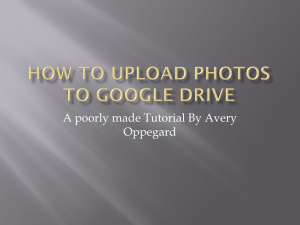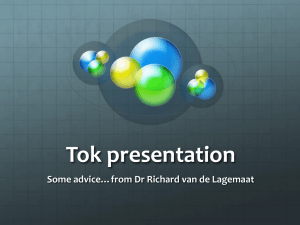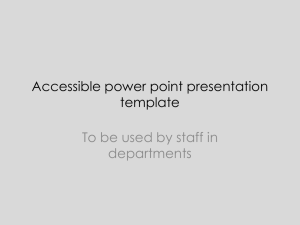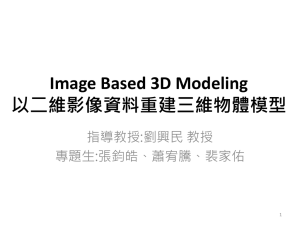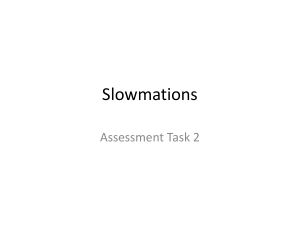Creating an Effective Board Presentation
advertisement
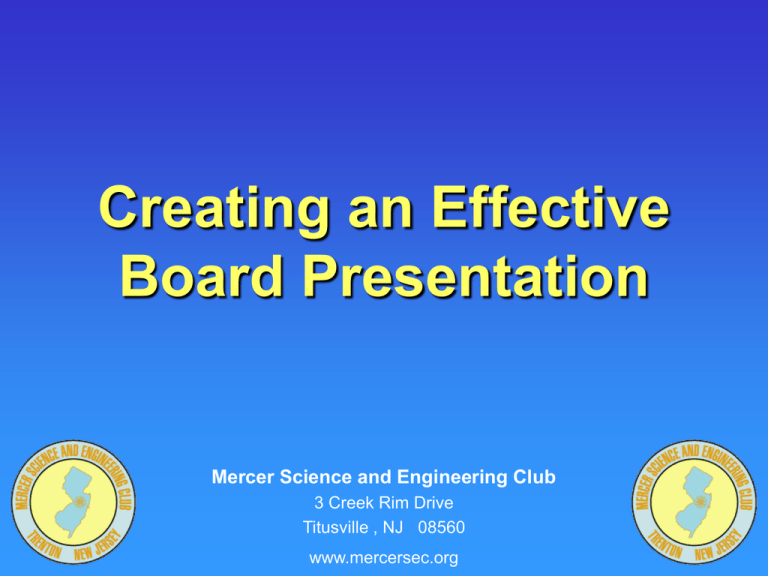
Creating an Effective Board Presentation Mercer Science and Engineering Club 3 Creek Rim Drive Titusville , NJ 08560 www.mercersec.org Overview • • • • • • • The starting point: good research Why is the presentation important What needs to be included Laying out the board Choosing fonts and figures Simplify, simplify, simplify Construction Tips KISS (Keep it simple, stupid) www.mercersec.org Good Research: It’s a start • You can’t hide bad research with a fancy presentation • Good research does not sell itself • Not all details are equally important • You will know what should be presented. It is simply a matter of how. • A research paper and research documents complement a presentation www.mercersec.org Why The Presentation Is Important • It helps sell your project and results • Elementary and Junior Division – Entries are judged exclusively on the presentation • Senior Division – Judging includes both the presentation and an oral defense – The presentation is the backdrop for the oral defense www.mercersec.org Presentation Components I • Required – Board – Abstract (can be on its own stand) • Recommended – Research paper – Research documents – Detailed results – Abstract handouts www.mercersec.org Presentation Components II • Optional – Audio/video presentation if it augments the static, board presentation – Project artifacts if useful for oral presentation (senior division) – Artifacts built by student (photos recommended) • Not Recommended – Project artifacts not used for oral presentation – Tools used for experimentation www.mercersec.org What The Presentation Does • Attracts attention to the project • Provides the initial introduction to viewers of the project (i.e. judges) • Provides organized overview of the project • Visual aid when describing a project • Helps students organize their thoughts when describing their project to judges • A picture is worth a thousand words www.mercersec.org Target Your Audience • Decide who is the target audience – Judges, teachers, parents, students • Design presentation to use terms familiar to the target audience • Explain unfamiliar terms or procedures • Use drawings and explanations that target the audience’s level of understanding www.mercersec.org Presentation Tells A Story • The board should speak for itself • Photos and drawings should enhance the story, not the way the presentation looks • The sequence of the story should be obvious www.mercersec.org What needs to be included on the board • • • • • • • • • Title • Recommended items Problem • Benefits Hypothesis • Optional items Materials • Future plans Methods • Photograph Data acknowledgements Analysis Photograph taken by … Conclusion Abstract (may be free standing) www.mercersec.org What NOT to include on the board • • • • Your name Name or logo of school or affiliation Sponsors Photos of identifiable people – Remember, it is the experiment that is important – Caveat: photos relevant to the experiment can be included www.mercersec.org More on Photos • Photos of researcher can be included only if they are showing something relevant to the research that could not be shown otherwise • No photos showing identifiable people • Any photographs showing identifiable people, other than the student investigator(s), must have a signed release form • No photographs of body parts or tissue, except those allowed by ISEF rules www.mercersec.org Laying out the board Model it first. It’s easier Project Title Problem Data Photos Analysis Hypothesis Materials Methods Conclusion www.mercersec.org Where The Eye Goes Decide what, when and where a viewer should look Project Title Title 1st Problem 2nd Data 3rd Analysis 4th Problem Data Photo Analysis Hypothesis Materials Methods Conclusion www.mercersec.org Choosing fonts and figures • Dont’s – MiXiNg Ffhts IS nft a gsod Idea – Too many colors are bad • Do’s – Fonts tips – Figures and Photos – Constructing a complex page www.mercersec.org Font Tips I • Use as few fonts as necessary • San serif fonts like Arial work best on presentations • Use serif fonts in research paper • Use fonts like Cooper for titles • Look for free fonts on Internet (www.1001freefonts.com) • NEVER USE ALL CAPS – It is hard to read – Use Bold, Italic or Color instead www.mercersec.org Font Tips II • Use same font and color for similar uses such as explanations of the Problem or Conclusion • Choosing font size – – – – Must be readable from at least 3 feet away Size should be related to surrounding text Size should indicate the text’s importance Titles should not giant while explanations are microscopic www.mercersec.org Figures and Photos • Should be viewable from at least 3 feet away • Figures should be as simple as possible – Use thick, not thin lines – Use colors judiciously – Use legends when necessary • Scan and print photos – Allows captions and acknowledgements to be included on same piece of paper – Annotations like arrows can be added www.mercersec.org Taking Photos • Take lots of photos of the same thing – Choose the best – Different angles can eliminate glare and highlight aspects of the project – Try close ups, multiple items in photo – Where does the photo fit in the story • Scan and edit photos – Crop: allows larger images, eliminates extraneous details – Print and try adjustments: a printed image looks different from it viewed on a display • Digital cameras: Always use highest resolution www.mercersec.org Constructing A Page • KISS – use a single page of paper for each item if possible • Generate pages using a word processor, presentation or drawing program • Use color printer to add borders and background • Don’t forget to try landscape page orientation www.mercersec.org Simplify, simplify, simplify • KISS – Less is better. Clutter is bad. • Eliminate redundant or unimportant information • Keep titles and sentences short and concise • Only show figures or photos that help explain key points • Leaves more space for other information www.mercersec.org Construction Tips I • • • • KISS Double sided tape for mounting paper/photos Always use a paper cutter Borders – Print borders on paper – Use a matte or colored paper to back paper • Colored board background – Highlights items placed on board – Buy colored background – Spray paint www.mercersec.org Construction Tips II • Maximize white background on paper – Minimizes print time and cost – Simplifies combining multiple pages • Use photo matte or glossy paper – Thicker paper, nothing shows through – Works well with double sided tape – Best for photos and figures • Use same type of paper throughout presentation. Differences stand out. www.mercersec.org Gotch ya’s • • • • Always use a spell checker Use a grammar checker Read the rules !!! Catch errors early: get multiple critiques from the initial layout design to the final product • Remember the ISEF abstract www.mercersec.org Video Presentations • The board should not require the video presentation • Do not duplicate board contents in presentation • Video presentation should show something that is more easily explained using a movie or animation versus a figure or photo • Do not include video presentation if it is unnecessary • Keep video presentation simple and short • Video presentation should run automatically www.mercersec.org More Suggestions • Peer review – Have students critique boards for extra credit – Rate boards on how well they explain a project – Use simplified judging forms • Involve other teachers – Make them aware of the projects and goals for improving the student’s presentation skills – English: effective text descriptions – Math and science: methods of presenting data – Computer: use of tools to create complex pages www.mercersec.org Summary • Good research means good artifacts (results) • Presentation is important because it is selling your project and its results • Include all relevant information • Board layout catches the eye and explains the details • Text and figures must be readable from a distance • Remember KISS but complexity is relative www.mercersec.org

